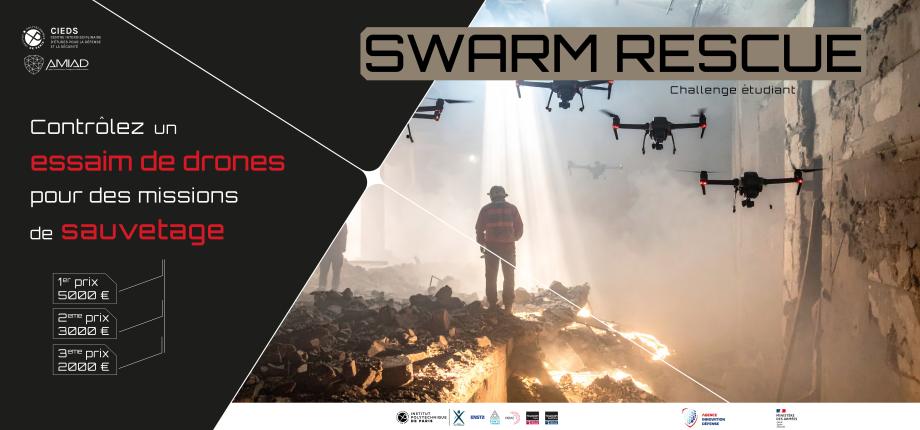Swarm Rescue Challenge 2025–2026: save lives by controlling a swarm of drones!

Explore an unknown area for rescue missions
The aim of this challenge is to explore an unknown, difficult-to-access and potentially dangerous area with the aim of rescuing people who may be immobile or lying on the ground in this area and guiding them to safety.
One example of an application is inspecting the basement of a collapsed building to locate people trapped in darkness and smoke, then guiding them to the exit to rescue them.
In a Python simulation, each team has a fleet of 10 drones, all equipped with:
- A limited-range communication system that can be jammed
- A laser rangefinder (LIDAR) to measure the distance to obstacles
- A semantic sensor to determine the nature of an object without data processing
- A GPS, which may be unavailable in certain areas
Each drone also has health points that decrease with each collision with the environment or other drones. When they reach zero, the drone is destroyed.
Conditions for participation and team support
All students from member schools of the Institut Polytechnique de Paris (École polytechnique, ENSTA, Télécom Paris, Télécom SudParis, ENPC and ENSAE) and schools under the supervision of the Ministry of the Armed Forces (ISAE-Supaéro, École de l'air et de l'espace, École navale) are eligible to participate in this competition.
The challenge does not require any specific technical skills, except for knowledge of the Python language. It will primarily draw on the creativity and scientific minds of the participants.
Throughout the challenge, teams will be supported by the organising team, made up of experts specialising in navigation, exploration and multi-drone coordination issues. This approach will enable students to design original and innovative solutions in line with the challenges of navigation, exploration and victim assistance.
Calendar for the 2025–2026 edition
- 21 October 2025: presentation session and launch of the challenge
- 4 December 2025: first interim assessment
- 21 January 2026: second interim assessment
- 19 March 2026: final assessment on an unknown map and presentation of projects to a panel of experts
Feedback on the previous edition
This edition marked a turning point in the history of this challenge, with Indian teams participating alongside French teams. The French final took place on 19 March at the X-Novation Centre, while the Indian final was held on 31 March at ENSTA.
French final
First place was awarded to Marc Chanet, Albert Llonch-Majo, Miguel Gisbert-Calvo, Isabela Ferreira-Teixeira and David Cardo-Sanz from ISAE-Supaero. The jury particularly noted the performance of the solution, the quality of navigation and obstacle/drone avoidance, and the richness of the cartographic representation.
Second place went to Romain Gambardella and Romain David from ISAE-Supaero. The jury particularly highlighted the original approach to dynamic planning, the strategy aimed at limiting the influence of errors in areas without GPS coverage, and the overall robustness of the solution.
Third place went to Hippolyte Verninas and Noé Vernier from Télécom Paris. The jury particularly appreciated the originality of the approach, which enabled optimised communication, the successful use of reinforcement learning for planning, and the rigorous evaluation of performance.
Indian final
First place was awarded to Amar Nath Singh, Tamanna Samdur, Gowsik Gurudev K., Nirmal Kumaran M from IIT Madras. The jury particularly appreciated the fluidity of the collaboration between the drones and the relay system for transporting the injured.
Second place was awarded to Kevin Dsouza, Neeraj Balachandar, Shriram Hari, A. Padmaprabhan from IIT Hyderabad. The jury particularly noted the effective management of the different roles of the drones and the quality of the presentation.
Third place went to Nandhini Sriram, Harshinni Babu, Sayantika from IIT Madras. The jury particularly appreciated the willingness to explore original approaches, which unfortunately led to a lack of robustness that penalised the final performance.
The Swarm Rescue challenge is a unique opportunity for students at the Institut Polytechnique de Paris and schools affiliated with the French Ministry of Defence to harness their creativity and curiosity to control a swarm of drones for rescue missions, working on topics that have a real impact!
The Swarm Rescue challenge is supported by the Defence Innovation Agency.













